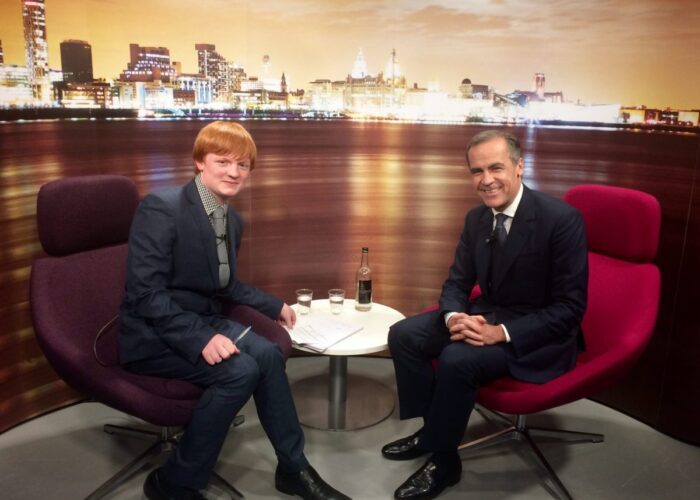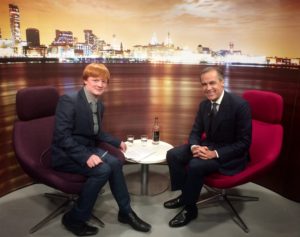
His decisions help to make Britain’s financial system tick, but the Governor of the Bank of England, Mark Carney, took time out of his hectic schedule to talk to JMU Journalism about Brexit, the state of the economy, and his love for Everton FC when he visited Liverpool today.
Mr Carney was in town to deliver the final Liverpool John Moores University Roscoe Lecture of 2016 and, in an exclusive interview, he warmed up for the big occasion by meeting JMU Journalism students at the Redmonds Building.
Prior to delivering his lecture to an audience of 2,000 at ACC Liverpool, the 51-year-old Canadian fielded a range of tricky questions, and provided an overview of the state of the nation’s health, along with the local outlook.
The governor has been widely reported as favouring a transition period before the country fully withdraws from the European Union, and he agrees that investment in the North of England must not suffer when Brexit is complete.
YouTube: JMU Journalism (interview highlights)
He told JMU Journalism: “I think we have to look at it as an opportunity. It is the decision of the people of the United Kingdom to leave the European Union.
“It is important that this process of determining what the new relationship will be with Europe is as smooth and as orderly as possible, and that businesses here in the North West and across the country can plan, with as much certainly as possible, for not just that new relationship with Europe, but potentially new ones with the United States, with Canada, Australia, China – the big emerging economies of the world.
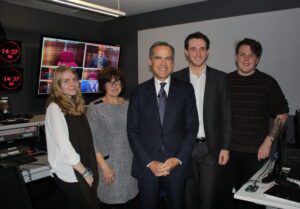
“That’s what will bring investment along. This process will create a number of changes and it’s up to all of us to make them as positive as possible.”
While Mr Carney said he felt the nation’s finances were relatively strong in terms of growth compared to other G7 countries, he admitted to having concerns about levels of productivity in the economy, and the fact that “wave growth itself hasn’t continued to pick up”.
He added: “More broadly, where I would be less happy and certainly people, whether they are here in Merseyside or across the country, are less happy is around broader issues about the security of work and uncertainty about the future.
“They know they have work today – not everybody – but most people do, but what kind of jobs are they going to get tomorrow?”
Turning his thoughts towards the future of JMU Journalism students, he added: “What is the media landscape going to be for you in years to come, and are you being equipped with the skills that you need? You are fortunate here at John Moores, so you are being equipped for those skills, but not everybody has access to that type of training and retraining, reskilling – if you will – that is necessary for the modern economy.”
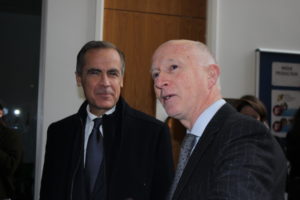
Mr Carney has local connections, with cousins on Merseyside who encouraged him decades ago to become an Everton supporter, and he revealed: “I’ve been an Evertonian since the late 1980s when I first lived in the United Kingdom. I saw them in the 1989 FA Cup [final] against Liverpool [when Everton lost 3-2]. Ian Rush is forever burned in my brain and [those] two brilliant extra-time goals for Liverpool to win it.
“I last saw them [Everton] in the semi-final of the FA Cup last year and recent performances, they’ve been good. I would join the manager in wishing they were slightly better. I am glad they snatched a point [against Manchester United] yesterday. I think we will do better, let’s put it that way, in terms of not dropping points unnecessarily.”
Speaking about the recent controversy over traces of animal fats being used in the manufacture of the new £5 notes, Mr Carney admitted that the Bank of England had been taken by surprise, adding: “We were unaware of it. One of the core things with the Central Bank is to be open, accountable and transparent.
“A member of the public had asked us about this. It actually took us about a month to track down the answer because we went to our main supplier… then they went to their suppliers, and their supplier’s supplier and discovered that there are these traces.
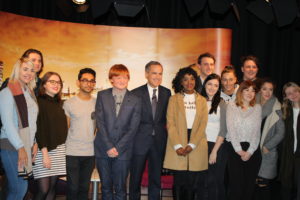
“To go back to football, the amount that’s in the note, from what we can tell, is the equivalent, if you filled Wembley Stadium three times over and then asked one person to leave, it’s that amount. But, the fact is that there are these animal fats and it is a cause of concern for some people. We respect those concerns, we treat it with seriousness, so now we are working with our suppliers to find out what the options are.
“The short answer is, yes [it was] a surprise, but we weren’t going to withhold that information. We were going to let everybody know as soon as we knew, and now we are trying to take action to see what we can do about it.”
With this and other topics explored in detail with JMU Journalism, Britain’s top financial executive was then off to his next engagement in Liverpool, having flown in from New York overnight.
JMU Journalism TV: Nathan Archer; Thomas Begbie; Rebecca Cleverley; Demi Cochrane; Lucy Fegan; Kerri Fitzpatrick; Amy Hendrie; Cara Hunter; Arun Lal; Natalie McGill; Kallem Morris; Cieran Simpson; Christella Twagirayezu; Sarah Williams; Savannah Wylde; Nuhamin Yadata
YouTube: JMU Journalism (full interview)

